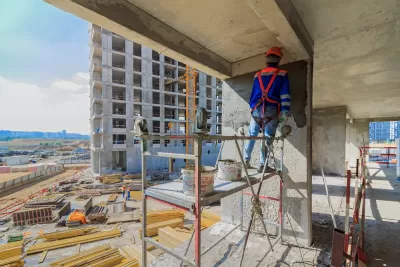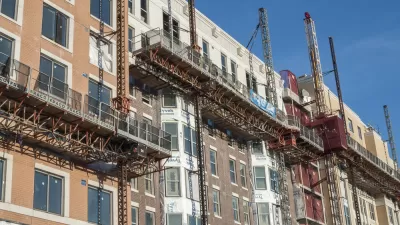A study published by a German researcher adds ammunition to the cause of improving housing affordability by legalizing and building new supply.

Joe Cortright shares news of new research that ties the amount of new rental housing to the cost of rent—the "tortured" supply and demand debate that defines housing policy in expensive areas of the United States.
"In our view, its [sic] been a growing demand for cities and urban living, running headlong into a relatively fixed, or at best slowly growing supply of urban housing that’s been the principle reason for affordability problems in many cities," writes Cortright. "But many housing advocates refuse to believe that increasing housing supply will have any beneficial effect on rents."
Andreas Mense, an economist at the University of Erlangen-Nuremberg, recently published a paper that agrees with Cortright's opinion on the matter. The paper finds that new supply has an effect throughout the market—not just at the top. According to Cortright, the findings of this paper add to a growing body of research showing that "new market rate construction triggers a chain-reaction of moves and price adjustments that rapidly propagate through an entire housing market and ultimately benefit low income households."
Notably, the paper also gives quantitative estimates of how much additional housing a city might need to build to stave off rent increases. In Munich, that number is a 20 percent increase over development totals from the last seven years, but the article cites a graph that charts the supply needed in a large number of German cities as well.
FULL STORY: Building more housing lowers rents for everyone

Maui's Vacation Rental Debate Turns Ugly
Verbal attacks, misinformation campaigns and fistfights plague a high-stakes debate to convert thousands of vacation rentals into long-term housing.

Planetizen Federal Action Tracker
A weekly monitor of how Trump’s orders and actions are impacting planners and planning in America.

In Urban Planning, AI Prompting Could be the New Design Thinking
Creativity has long been key to great urban design. What if we see AI as our new creative partner?

King County Supportive Housing Program Offers Hope for Unhoused Residents
The county is taking a ‘Housing First’ approach that prioritizes getting people into housing, then offering wraparound supportive services.

Researchers Use AI to Get Clearer Picture of US Housing
Analysts are using artificial intelligence to supercharge their research by allowing them to comb through data faster. Though these AI tools can be error prone, they save time and housing researchers are optimistic about the future.

Making Shared Micromobility More Inclusive
Cities and shared mobility system operators can do more to include people with disabilities in planning and operations, per a new report.
Urban Design for Planners 1: Software Tools
This six-course series explores essential urban design concepts using open source software and equips planners with the tools they need to participate fully in the urban design process.
Planning for Universal Design
Learn the tools for implementing Universal Design in planning regulations.
planning NEXT
Appalachian Highlands Housing Partners
Mpact (founded as Rail~Volution)
City of Camden Redevelopment Agency
City of Astoria
City of Portland
City of Laramie





























